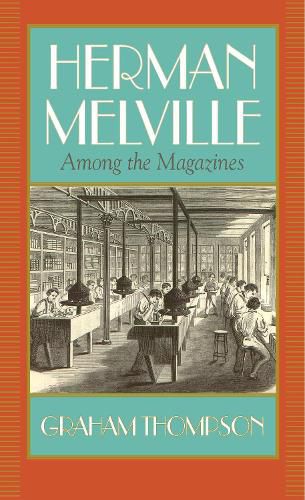Readings Newsletter
Become a Readings Member to make your shopping experience even easier.
Sign in or sign up for free!
You’re not far away from qualifying for FREE standard shipping within Australia
You’ve qualified for FREE standard shipping within Australia
The cart is loading…






What I feel most moved to write, that is banned, - it will not pay. Yet, altogether, write the other way I cannot.
Herman Melville wrote these words as he struggled to survive as a failing novelist. Between 1853 and 1856, he did write
the other way,
working exclusively for magazines. He earned more money from his stories than from the combined sales of his most well known novels, Moby-Dick, Pierre, and The Confidence-Man.
In Herman Melville Graham Thompson examines the author’s magazine work in its original publication context, including stories that became classics, such as
Bartelby, the Scrivener
and
Benito Cereno,
alongside lesser-known work. Using a concept he calls
embedded authorship,
Thompson explores what it meant to be a magazine writer in the 1850s and discovers a new Melville enmeshed with forgotten materials, editors, writers, and literary traditions. He reveals how Melville responded to the practical demands of magazine writing with dazzling displays of innovation that reinvented magazine traditions and helped create the modern short story.
$9.00 standard shipping within Australia
FREE standard shipping within Australia for orders over $100.00
Express & International shipping calculated at checkout
What I feel most moved to write, that is banned, - it will not pay. Yet, altogether, write the other way I cannot.
Herman Melville wrote these words as he struggled to survive as a failing novelist. Between 1853 and 1856, he did write
the other way,
working exclusively for magazines. He earned more money from his stories than from the combined sales of his most well known novels, Moby-Dick, Pierre, and The Confidence-Man.
In Herman Melville Graham Thompson examines the author’s magazine work in its original publication context, including stories that became classics, such as
Bartelby, the Scrivener
and
Benito Cereno,
alongside lesser-known work. Using a concept he calls
embedded authorship,
Thompson explores what it meant to be a magazine writer in the 1850s and discovers a new Melville enmeshed with forgotten materials, editors, writers, and literary traditions. He reveals how Melville responded to the practical demands of magazine writing with dazzling displays of innovation that reinvented magazine traditions and helped create the modern short story.